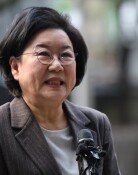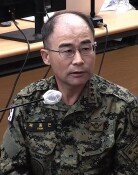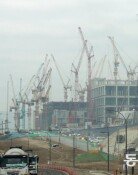Customs office to check overseas credit card purchase
Customs office to check overseas credit card purchase
Posted April. 20, 2013 02:33,
As early as July this year, any amount more than Koreas per capita tax exemption limit of 400 U.S. dollars paid by credit card overseas including payment at duty free shops, the transaction information will be notified to the Korea Customs Service. Anybody who fails to report such purchases to the immigration office when entering Korea could be subject to customs investigation.
Under the revised law that will allow the customs agency to view capital transactions irrelevant to trade, crackdown on "illicit foreign exchange transactions" is also expected to grow significantly.
Buying expensive products overseas while not paying taxes when entering Korea is like smuggling. We will ensure equity of taxation by thoroughly levying taxes on expensive products exceeding the tax exemption limit," said Baek Un-chan, head of the Korea Customs Service, in an interview with The Dong-A Ilbo at the Seoul Customs Service office last Friday.
He also said, Within the first half of this year, we will submit a bill to the National Assembly for an amendment of customs law to allow the Customs Service to receive the credit card statement of amounts, which are spent overseas by Korean residents, at any time and use the statement for taxation. So far, the customs office has received the statements once a year from domestic credit card companies. The state agency, however, is now seeking to cut the time required by receiving relevant materials monthly or real-time so as to use the information to levy taxes.
At the moment, only 1.5 to 3 percent of people entering Korea go through checkups by customs officials. Finding people violating tax law is not easy because customs staff select people to open their luggage randomly, except those in the black list. If we get statements on overseas credit card use in advance and check primarily those who have purchased expensive products overseas, well be able to find more lawbreakers, Baek explained.
According to the Korea Customs Service, it expects reinforced customs investigation will increase voluntary reporting rate, which will in turn lead to an annual 60 billion won (54 million dollars) increase in revenue.
The underground economy that is under our supervision includes tax evasion through smuggling and illegal foreign exchange dealings, and the size of these activities is estimated to be worth 47 trillion won (42 billion dollars) annually," the customs chief said. "We are planning to get an additional 2 trillion won (1.8 billion dollars) in revenue every year by focusing on cracking down on the underground economy."
The customs office will also expand its "investigation authority to capital transactions." Currently the office has investigated only capital transactions, which are related to trade such as raw material purchase and export. Baek said, Even if a suspect of illicit foreign exchange transaction who is carrying cash is apprehended, we cannot investigate further as long as the person insists the money is for `personal investment.` An enhanced investigative authority will enable us to find out tax evasion cases or illicit foreign exchange dealings through overseas subsidiaries.
The customs chief thinks that to bring the underground economy into the light, the information barriers among government bodies need to be dismantled at first. Last year alone, about 5.8 billion dollars were carried into or out of Korea. To check whether the money is being carried legally, we need information from the Korea Financial Intelligence Unit. If we have the authority to utilize large cash transaction data, we can find illegal foreign exchange dealings amounting to 5 trillion won (4.5 billion dollars) every year, he said.
He said, Out of 216.4 trillion won (193 billion dollars), the revenue that the government should collect this year, the Customs Service should bring in 69.3 trillion won (61.7 dollars), approximately 32 percent. With loosened screening at the boarder, money can leave Korea illegally and hide overseas. And once this happens, cracking down will be more difficult. Thats why there are so many things that Customs Service has to take care of.
tnf@donga.com



![화장실 갇혔을 때 생존법…“최후에는 변기뚜껑” [알쓸톡]](https://dimg.donga.com/c/138/175/90/1/wps/NEWS/IMAGE/2025/12/26/133042007.3.png)



